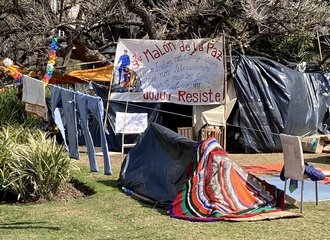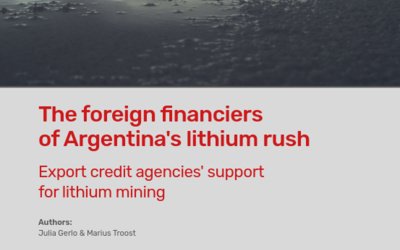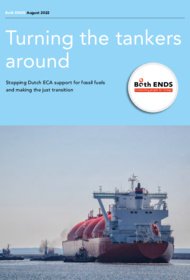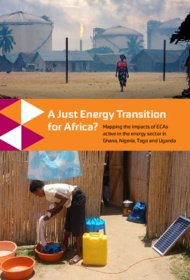Recommendations to the foreign financiers of Argentina's lithium rush
To realise the energy transition, large quantities of minerals and metals such as lithium, cobalt and rare earth metals are needed. These raw materials are mainly extracted in countries in the global South, and unfortunately this is almost always accompanied by human rights violations and environmental destruction. Today – also in light of EU Raw Materials Week that is happening this week – Argentinian organisation FARN and Both ENDS publish a joint report on the extraction of lithium in Argentina.
How can we ensure that people and nature are not harmed by the extraction of raw materials for our energy transition? Is it wise to provide export support to companies entering this market? Using the Argentinian case, the report attempts to answer these and other obvious dilemmas surrounding the extraction of transition minerals. Marius Troost is one of the authors of the report and gives us some insight.
Why did FARN and Both ENDS decide this was an urgent matter to touch upon?
Marius: "Making the transition from fossil fuels to renewables is priority number one. Yet we tend to forget that our clean energy supply needs resources as well. These will also have to be extracted somewhere, bearing in mind that mining has a tremendous impact wherever it takes place. We are seeing an increased interest by businesses and governments in securing our so-called 'transition minerals', including interest by Export Credit Agencies (ECAs – see box) from the Global North. With this report, we show which governments and ECAs are already financing the lithium sector in Argentina and the impacts this has on people and environment. "
What is so damaging about lithium extraction?
"Lithium extraction requires tremendous amounts of water in places - like the salt flats - where water is extremely scarce. This comes at the cost of drinking water and agriculture. It also has severe impacts for the fragile ecosystems in the area. What's more, lithium mining in Argentina still has a very extractivist character and reinforces the unequal distribution of wealth and the unequal trade balance between North and South"
What is the main conclusion of the report?
"We are already seeing Export Credit Agencies move into the lithium sector in Argentina. Foreign companies active in the sector are supported to undertake their business activities. At this point it's the Canadian and the Korean ECAs, but we will surely see more interest in the future. Unfortunately, the communities of the High Andean wetlands where the lithium extraction is taking place, do not at all benefit. They only suffer the significant environmental impacts and human rights violations."
How can we turn the tide, what should be done internationally?
"First and foremost, the global North should look critically at its own energy and material consumption. I mean: replacing our entire fleet of petrol-powered cars with electric ones is simply not a realistic option, as resources like lithium are limited too and the extraction will come at the cost of communities in the global South. We should really also think about less cars, rather than alternative cars. At the same time, international businesses and governments should take care to guarantee environmental and human rights. They should carefully consult the local communities and respect their 'right to say no' to projects on their land."
Who should definitely read this report?
"The EU is currently working on finalising its Critical Raw Materials Act. And globally, businesses and ECAs are eager to move into the raw materials space. The report has practical recommendations on how to go about this – we hope it will help them make informed policies that use a human rights and environment centred approach."
Export Credit Agencies and Investment Insurance Agencies, commonly known as ECAs, are public agencies that provide government-backed loans, guarantees, credits and insurance to private corporations from their home country.
ECAs make it easier for those corporations to do business abroad, particularly in the financially and politically risky developing world. Most industrialised nations have at least one ECA, which is usually an official or quasi-official branch of their government.
For more information
Read more about this subject
-
Publication / 13 November 2023
-
Publication / 29 August 2022
-
News / 25 January 2024
'We can not have a transition when we do not talk about consumption patterns'
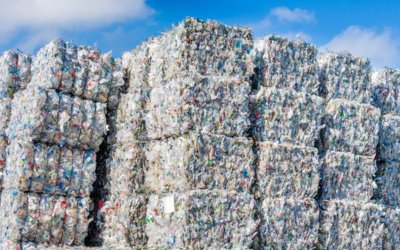
The parliamentary elections in the Netherlands are over, and the dust has somewhat settled. No matter what government emerges from the process, one thing is clear: in the Netherlands the main focus is on the Netherlands. Foreign affairs were hardly mentioned during the elections and the same applies to the process of forming a new coalition. More alarmingly, some of the winners in the elections want to cut themselves off even further from the world around us.
-
Publication / 15 March 2023
-
Publication / 17 February 2022
-
News / 20 February 2023
Almost 60 organisations send a letter about fossil export support to Dutch Parliament

Today, a letter, undersigned by almost 60 organisations from countries that face the consequences of fossil fuel projects or stand in solidarity, has been sent to the Dutch Members of Parliament. This Thursday, a debate about the export credit facility and the policies around it, will take place in the Dutch Parliament. The coalition calls upon Dutch politicians and policy makers to stand up against any form of export support for fossil fuel projects that are to be executed by Dutch companies abroad, expecially in the global South.
-
Letter / 4 May 2023
Letter from NGOs to Dutch export credit agency: CSR policy must be strengthened
The Dutch government, through its export credit agency Atradius DSB (ADSB), provides export support to companies that undertake activities abroad. The state wants projects it insures to have no negative consequences for people and the environment and therefore sets requirements for corporate social responsibility (CSR). A consultation on CSR policy ran until the end of April, to which a coalition of thirteen social organisations from the Netherlands and abroad, including Both ENDS and Milieudefensie (Friends of the Earth the Netherlands), responded.
-
Press release / 19 May 2022
122 CSOs warn signatory countries they have only six months left to meet COP26 commitment to end international public finance for all fossil fuels
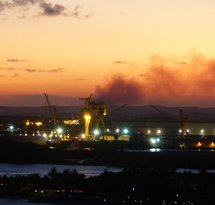
Today, 122 civil society groups are releasing letters to eleven government signatories to the Glasgow Statement on International Public Support for the Clean Energy Transition, laying out the actions they must take as soon as possible to meet their commitment. In this joint statement at COP26, 35 countries and 5 public finance institutions committed to end their international public finance for 'unabated' fossil fuels by the end of 2022, and instead prioritise their "support fully towards the clean energy transition."
-
Letter / 28 February 2023
175 CSOs call on world leaders to end OECD export finance for oil and gas
This joint position launched by 175 civil society organisations from 45 countries calls on world leaders to end OECD export finance for oil and gas, and explains how it can be done.
-
News / 19 May 2022
Response to government’s letter to parliament on implementation of the Glasgow Declaration
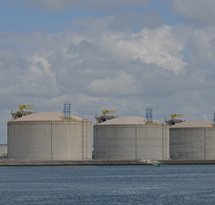
Both ENDS and 95 other organisations* today sent a letter to State Secretary for Finance Marnix van Rij and Minister for Foreign Trade and Development Cooperation Liesje Schreinemacher calling on them to implement the Glasgow Declaration in full. In this agreement, which the Netherlands and 33 other countries signed at the Glasgow climate conference, the signatory countries pledge to stop all public funding for fossil projects by the end of 2022.
-
Letter / 20 February 2023
Letter of international CSO's to Dutch Parliament: close gaps in Dutch policy on limiting public finance to fossil fuels
In October 2022, the Dutch government published a policy to implement the COP26 statement in which it promised to stop public finance for fossil fuel projects abroad by the end of 2022 . The proposed policy, unfortunately, has quite some 'loopholes' that make it possible for the Dutch government to keep supporting large fossil projects abroad for at least another year. These projects often run for years and will have a negative impact on the countries where they take place for decades to come.
-
Publication / 11 November 2020
-
Event / 30 January 2024, 14:00 - 15:30
The environmental and human rights impacts of raw material extraction: Lithium in the High Andes, Argentina
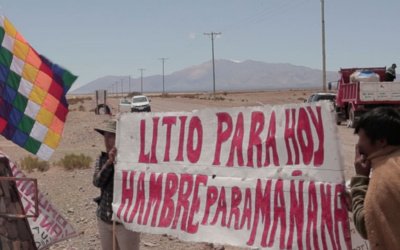
Following the Raw Material Week in November 2023 and the provisional agreement on the Critical Raw Material Regulation, Wetlands International Europe together with Both ENDS and the EU Raw Materials Coalition have organised a session seeking an open discussion on the environmental and human rights impacts of raw materials extraction, in and around vulnerable areas.
-
Press release / 3 November 2022
The Netherlands breaks major climate promise to end public financing for international fossil fuel projects

Today, a week before the international climate summit in Egypt, the Dutch Government has broken a major climate promise it made last year to end public financing for international fossil fuel projects. International and Dutch NGOs argue that the new policy published by the Dutch Government on restricting finance for fossil fuels has such significant loopholes, that it essentially means The Netherlands has reneged on its promise.
-
Event / 27 October 2023, 20:00
Debate: Fossil disaster in Mozambique
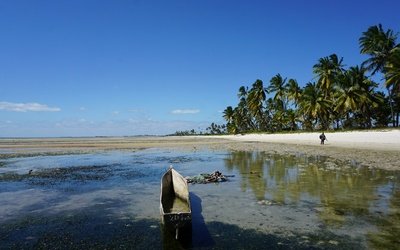
In 2021, the Dutch government provided a €1.000.000.000,- worth export credit support to Totals Mozgas project in Cabo Delgado, despite civil society warnings about human rights and environmental risks. The gas exploitation fueled a violent conflict, culminating in the Palma attack, displacing 800,000 people and killing 1,200 people.
-
Press release / 25 May 2022
Award of export support for controversial project in Manilla undermines the Netherlands’ environmental and CSR ambitions
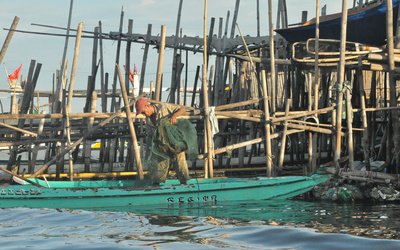
Dutch export credit agency Atradius DSB announced yesterday that it is to provide export credit insurance worth 1,5 billion euros to Dutch dredging company Boskalis for a controversial land reclamation project in the Philippines. According to Dutch and international organisations, including Both ENDS, CARE Netherlands, IUCN NL, Kalikasan PNE and Oceana Philippines, the award of export credit insurance for this project runs contrary to the Netherlands' ambitions in the areas of environment and corporate social responsibility (CSR).
-
Letter / 15 December 2022
No export credit support for Santos FPSO
In October this year, the Dutch government published a policy to implement the COP26 statement in which it promised to stop public finance for fossil fuel projects abroad by the end of 2022 . In spite of this pledge, the Netherlands is considering granting an export credit insurance to a floating production storage and offloading (FPSO) vessel that will be used to produce oil and fossil gas in Brazil for a period of 30 years.
-
Letter / 30 September 2022
CSO letter to the Netherlands on urgently implementing COP26 Commitment
Last year at COP26, the Netherlands, alongside 38 other governments and institutions, committed to the Glasgow Statement on International Public Support for the Clean Energy Transition. By signing this statement, the Netherlands has committed to ending new direct public support for the international unabated fossil fuel energy sector by the end of 2022- a commitment it has yet to deliver.
With this letter, 20 civil society organisations call on the Netherlands to announce its implementation policies for the Glasgow Statement ahead of the Export Finance for Future (E3F) Summit on the 3 November. The E3F Summit is a critical opportunity for the Netherlands to uphold the commitments made in Glasgow last year, alongside all other E3F members.
The recent E3F transparency report highlighted that Netherlands insured 6x more fossil fuel transactions than renewables from 2015-2020, with 3 billion EUR in fossil fuel transactions compared to only 0.5 billion EUR in renewables. This demonstrates that a fossil-fuel exclusion policy for Dutch export support is urgent, and essential, to align the Netherlands with its Glasgow commitment and the Paris Agreement.
-
Video / 21 October 2014
The meandering roads of Suape

This video tells the story of the families that were forced out of there homes and evicted from their lands in the Suápe region in Brazil. The local authorities have decided to expand the shipyard and the sea-harbour, but they have failed to take into account the negative impacts on the local people and their environment. Dutch company Van Oord is executing part of the dredging, supported by export credit agency Atradius DSB.
-
Video / 21 October 2014
Tatuoca, a stolen island

This video tells the story of the families that were forced out of there homes and evicted from their lands in the Suápe region in Brazil. The local authorities have decided to expand the shipyard and the sea-harbour, but they have failed to take into account the negative impacts on the local people and their environment. Dutch company Van Oord is executing part of the dredging, supported by export credit agency Atradius DSB.



